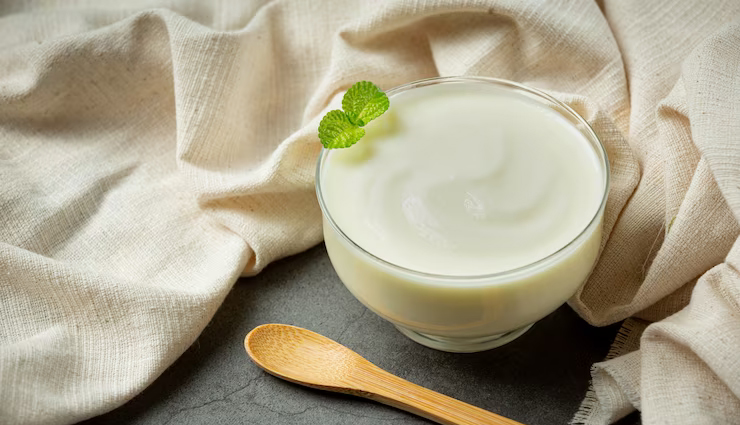- Home›
- Healthy Living›
- Know How Curd Can Affect Your Health During The Monsoon Season
Know How Curd Can Affect Your Health During The Monsoon Season
By: Priyanka Maheshwari Sat, 08 July 2023 2:39:20

Curd, also known as yogurt, is a popular dairy product consumed worldwide. It is made by fermenting milk with specific strains of bacteria, such as Lactobacillus bulgaricus and Streptococcus thermophilus. This fermentation process converts the lactose (milk sugar) into lactic acid, which gives curd its tangy flavor and thick texture.
Curd is highly nutritious and offers numerous health benefits. Here are some key aspects of curd:
Probiotics: Curd is rich in beneficial bacteria known as probiotics. These live cultures help promote a healthy balance of gut bacteria, aiding digestion and supporting a strong immune system.
Calcium: Curd is an excellent source of calcium, a mineral essential for healthy bones, teeth, and muscle function. It also contains other minerals like phosphorus, potassium, and magnesium.
Protein: Curd is a good source of high-quality protein, providing essential amino acids necessary for various bodily functions, including tissue repair and growth.
Vitamins and Minerals: Curd contains vitamins like B12, B2 (riboflavin), and B5 (pantothenic acid), along with minerals like zinc and selenium. These nutrients contribute to overall health and wellbeing.
Digestive Health: The probiotics present in curd help improve gut health by promoting the growth of beneficial bacteria. They can aid digestion, alleviate constipation, and enhance nutrient absorption.
Lactose Intolerance: People with lactose intolerance may find curd easier to digest compared to regular milk. The fermentation process reduces lactose content, making it more tolerable for individuals with lactose intolerance.
Weight Management: Curd is a satisfying and nutritious food that can help control hunger and promote weight management. The high protein content helps increase satiety, while the low-calorie nature of curd makes it a healthy snack option.
Skin and Hair Health: Applying curd topically or consuming it can have beneficial effects on the skin and hair. It can help moisturize the skin, soothe inflammation, and improve hair texture and shine.
Curd can be enjoyed plain, used as a base for smoothies, added to sauces, or incorporated into various dishes and desserts. However, it's important to ensure the quality, freshness, and hygiene of the curd you consume. During the monsoon season, there are a few factors to consider that can affect its impact on your health. Here's how curd can potentially spoil your health during the monsoon season:

# Bacterial Contamination
The monsoon season is characterized by increased humidity, which creates an ideal environment for bacterial growth. If curd is not handled, stored, or prepared hygienically, it can get contaminated with harmful bacteria such as E. coli or Salmonella. Consuming contaminated curd can lead to foodborne illnesses and digestive problems.

# Spoilage
The humid weather can cause curd to spoil quickly. When curd is left unrefrigerated for a long time, it can turn sour or develop mold. Consuming spoiled curd can result in digestive discomfort, food poisoning, or other health issues.

# Weakened Digestive System
During the monsoon season, our digestive system may become more sensitive and prone to infections. The consumption of curd that is not fresh or properly stored can strain the digestive system and lead to digestive problems like bloating, diarrhea, or stomach upset.
# Allergies and Sensitivities
Some individuals may have allergies or sensitivities to curd or dairy products. Consuming curd during the monsoon season, especially if it's contaminated or not handled properly, can exacerbate allergic reactions or digestive sensitivities.

# Increased Mucus Production
Some people may experience an increase in mucus production after consuming curd, which can lead to congestion, runny nose, or coughing, especially if they have respiratory conditions like asthma.

# Increased Kapha Dosha
In Ayurveda, curd is considered cooling and can potentially increase Kapha dosha, which is associated with congestion and mucous production. Those with Kapha imbalances may experience worsened symptoms after consuming curd.
To minimize the risk of health problems associated with curd during the monsoon season, it's important to take the following precautions:
- Choose curd from reliable sources and ensure its freshness.
- Store curd properly in a cool and clean environment, preferably in the refrigerator.
- Consume curd that is freshly made or stored for a short period.
- Practice good hygiene, including clean utensils and hands while handling curd.
- If you have a sensitive digestive system or allergies, consult a healthcare professional to determine if curd is suitable for you.
By being mindful of these factors and following proper hygiene and storage practices, you can enjoy curd safely during the monsoon season while reaping its nutritional benefits.





